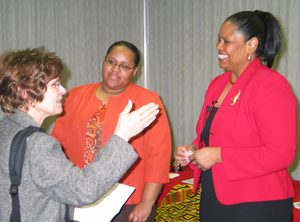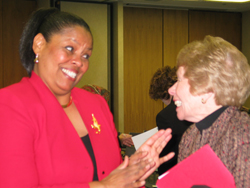 |
Valda Boyd Ford (right), director of UNMC/The Nebraska Medical Center Community and Multicultural Affairs, speaks with an audience member following the 2007 Martin Luther King Jr. Commemoration on Monday as UNMC’s Tamicka Bradley (center) looks on. Ford delivered the keynote address at the event, which has become one of the best-attended Martin Luther King Jr. Day commemorations in Omaha. |
In fact, Dr. King was attentive to struggles and injustice around the world, and particularly in Africa, Ford told the roughly 300 people who braved frigid temperatures and icy roads to attend the 2007 Martin Luther King Jr. Commemoration at the Storz Pavilion in Clarkson Tower.
“Dr. King’s interest in fighting injustice didn’t stop at the U.S. border,” said Ford, director of UNMC/The Nebraska Medical Center Community and Multicultural Affairs. “He said ‘Injustice anywhere is a threat to justice everywhere.’ ”
During his life Dr. King traveled to many countries where grave injustices were being committed, Ford said during her presentation titled “Extending the Dream: Realizing the Nightmare of Third World Refugees.”
Ford herself has worked in refugee camps in some of these same countries, including Ghana, Sierra Leone and Sri Lanka.
What she saw during that time demonstrates that society has a long way to go before Dr. King’s dream of all people coming together peacefully becomes a reality.
During her visits, Ford witnessed unimaginable human suffering caused by war, racism and poverty, which Dr. King called “The Three Evils.”
During her presentation, images from Ford’s time at the refugee camps flashed on a large screen. One picture showed a hole in the ground that served as a toilet, another showed a piece of foam a refugee would sleep on and another photograph showed pieces of rolled cow skin that refugees would eat.
 |
Valda Boyd Ford (left), shares a laugh with Mary Haven, former associate dean of the School of Allied Health Professions, following the 2007 Martin Luther King Jr. Commemoration. |
The stories of suffering she heard were horrifying in their details and numbing in their quantity, Ford said.
In fact she heard a similar story from so many women refugees from civil-war torn Liberia that she had a hard time distinguishing one tale from the next.
The story typically went as such: army troops forced their way into a family’s home and determined whether the family supported the opposition. If so, they would drag the father to prison or kill him on the spot, rape the wife and kill the family’s children.
One version of the story, however, stood out and provided a needed ray of hope, Ford said.
The story started the same as many others for a Liberian couple named Betty and Anthony. Troops invaded their house, beat Anthony within an inch of his life and raped Betty several times.
Anthony was taken to a prison and Betty was left for dead.
Anthony later escaped prison and headed to a refugee camp on Africa’s Ivory Coast. Betty survived her attack and made it to another refugee camp. Both assumed the other had died.
Someone at the Ivory Coast camp recognized Anthony and told him Betty was alive and in another refugee camp. Anthony saved for six months to gather money to see Betty. But by the time he got to the camp, Betty had left. Months later, word got to Betty that Anthony had come looking for her at the refugee camp but when she went back, he had returned to the Ivory Coast. This time, Betty saved up to make the trip and the couple reunited.
At times she struggles to believe that justice exists in this world, Ford said, but the story of Betty and Anthony gives her hope.
It was this sense of hope and love that was the heart of Dr. King’s teachings, she said. And it would be those qualities that would have him calling for the world to confront the current injustices abroad and at home, Ford said.
To make Dr. King’s dream a reality, Ford said, people must assume attitudes of service and goodwill and harness their talents and resources to be used for justice and good.
Learning about and exposing oneself to other cultures, volunteering and giving what one can are all ways a person can work toward making Dr. King’s dream of global peace and goodwill a reality, Ford said.
“Dr. King represented non-violence and said the non-violent person is a courageous person,” Ford said. “Are we courageous enough to rid the world of this violence and injustice?”